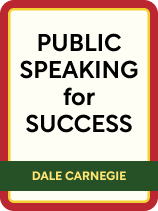

This article is an excerpt from the Shortform book guide to "Public Speaking for Success" by Dale Carnegie. Shortform has the world's best summaries and analyses of books you should be reading.
Like this article? Sign up for a free trial here.
How detailed should you be when you plan the ending of your speech? Is it ever a good idea to close with a quote?
In his classic book Public Speaking for Success, Dale Carnegie shares his essential teachings about crafting and delivering a memorable speech. He includes some guidelines on closing your speech effectively.
Read more to learn how to close your speech in a way that leaves your audience wanting more.
Closing Your Speech
Closing your speech in a memorable way requires that you leave the audience with a final, powerful, and clear restatement of your argument’s main thrust. According to Carnegie, there’s no perfect prescription for achieving this. You won’t do it that well in your first few speeches, but, over time, you’ll develop a sense of when your point is clear and when the timing is right to end.
Generally, that point comes not long after the peak, or climax, of your speech. That is, once you’ve landed on the main, cumulative thrust of your argument, start looking to wrap the speech up. This works because you’ll stop while your audience is still enjoying your speech and leave them wanting more. If, in contrast, you drag things out, you’ll lose their interest.
(Shortform note: Another way to look at your peak or climax is as your main point, which Joel Schwartzberg defines in Get to the Point! as a clear assertion that you can explain and support. Many people, he argues, fail to get to the point—often because they don’t really know what it is—and thereby lose their listeners. If you’re still feeling fuzzy on your point, use Schwartzberg’s strategy to identify a proper point: State your point as an “I believe that (your point)” sentence. If it doesn’t make sense (“I believe that bad construction and zoning laws”), it’s not a point. Then, rewrite it to fit this formula—“I believe that bad construction and zoning laws lead to runaway development, inefficient use of resources, and ecological damage.”)
Carnegie asserts that, since endings are so important, you should plan yours out word for word. Write it out ahead of time, revise it, and try it out on friends and family to get feedback. Keep revising it and getting feedback until your helpers clearly feel roused by the ending. As you’re crafting your ending, consider Carnegie’s four techniques:
- Recap your argument. This refreshes your logic in the audience’s minds and helps them put the whole thing together.
- Call for action. Having made your argument, make a passionate statement as to what needs to be done about your topic.
- Thank your audience. If you sincerely feel it, express your pleasure, gratitude, or enjoyment at speaking for them.
- Use a famous quote. If a famous quote more powerfully sums up your argument than you could, take advantage of that fact.
| More Ways to End Your Speech In TED Talks, Chris Anderson corroborates Carnegie’s emphasis on the importance of a strong ending. He adds that the ending is how your audience will remember your entire speech and that even the best speeches can fail due to poorly planned endings. He offers a few different options from Carnegie, including: • Apply your main point to a broader situation: “If this change in pedagogy worked in one school district, imagine how it could transform education nationwide!” • Declare your mission: “ … That’s why I’m starting a consulting firm to teach this new methodology everywhere I can.” • Paint a picture of your dream: “ … Just think—thousands of teachers and students with happier, more effective classrooms, better relationships, and fewer kids left to slip through the cracks.” |

———End of Preview———
Like what you just read? Read the rest of the world's best book summary and analysis of Dale Carnegie's "Public Speaking for Success" at Shortform.
Here's what you'll find in our full Public Speaking for Success summary:
- Why public speaking is one of the most important skills to have
- How to overcome the fear of public speaking and adopt poise
- How to research, write, and deliver a memorable speech






